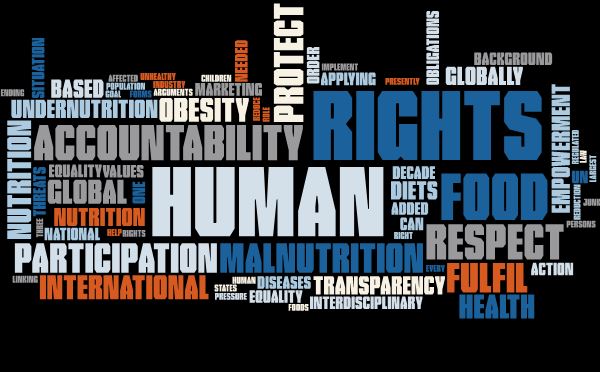One in every three persons globally is affected by malnutrition in some form. Malnutrition represents one of the largest threats to public health, development and national economies.Ending this situation is part of the Sustainable Development Goals and the background for the UN Decade of Action on Nutrition 2016-2025.
The international human rights framework constitutes an opportunity to increase awareness and strengthen accountability in the context of malnutrition in all forms. By being parties to international human rights treaties, most states in the world are obliged to respect, protect and fulfill peoples’ rights to adequate food and to diet-related health.
What are the arguments for applying a human rights-based approach to malnutrition in all forms, and related diseases? What are the “values added” through such an approach? What obligations do states have to help implement the right to food and to health for their populations?
Welcome to an open interdisciplinary seminar linking law, human rights and nutrition!
PROGRAMME (print version)
The programme include the logos of all the organizers, which support the UN Decade of Action on Nutrition 2016-2015 and appreciate the permission to use the Decade's official logo granted by its Secretariat.
09:00 Welcome Nanna Lien, Department of Nutrition, Faculty of Medicine, University of Oslo
09:10 Opening words Per Morten Sandset, Vice-Rector, University of Oslo Member of the Board of UiO:Life Science
09:20 - 09:55 PART I: THE GLOBAL THREATS OF UNDERNUTRITION AND OBESITY
Moderator: Nanna Lien
The double burden of malnutrition and its impacts Peter Milton Rukundo, Kyambogo University Department of Human Nutrition and Home Economics, Kampala, Uganda
Poverty, inequality and commercial interests as causes of maternal and child undernutrition Liv Elin Torheim, Department of Nursing and Health Promotion, Faculty of Health Sciences, OsloMet - Oslo Metropolitan University
Food systems and food environments as drivers of the global obesity epidemic Nanna Lien, Department of Nutrition, Faculty of Medicine, University of Oslo
09:55 - 10:25 PART II: SOME EFFORTS TO REDUCE MALNUTRITION GLOBALLY
Moderator: Anne Lene Løvhaug
WHO’s work to reduce malnutrition in all its forms in children: approaches and lessons learned Kaia Engesveen, Department of Nutrition for Health and Development, World Health Organization (WHO), Geneva
Child obesity and attempts towards preventive action world-wide Louise Meincke, World Cancer Research Fund International
The Norwegian experience to improve diets Henriette Øien, Division of Public Health, Norwegian Directorate of Health
10:25 - 10:45 Coffee / Tea / Fruits
10:45 - 11:55 PART III: DIET-RELATED HEALTH AND HUMAN RIGHTS
Moderator: Liv Elin Torheim
Adequate food and diet-related health as international legal human rights Asbjørn Eide, Norwegian Centre for Human Rights, Faculty of Law, University of Oslo
The UN Convention on the Rights of the Child - protecting children’s freedom from all forms of malnutrition Katharina O’Cathaoir, WELMA Research Group, Faculty of Law, University of Copenhagen
The UN Guiding Principles on Business and Human Rights: Obligations of States to protect and responsibilities of businesses to respect human rights Bård Anders Andreassen, Norwegian Centre for Human Rights, Faculty of Law, University of Oslo
5 minutes for clarifications
Obligations of states to protect public health: the case of childhood obesity Amandine Garde, Law & Non-Communicable Diseases Research Unit, Faculty of Law and Social Justice, University of Liverpool
Experiences from work with food businesses to respect human rights in food marketing activites related to children Tulika Bansal, Danish Institute of Human Rights, Department of Human Rights and Development, Program for Business and Human Rights
Marketing unhealthy foods to children in the digital age - challenges presented by intersecting human rights Mimi Tatlow-Golden, Faculty of Wellbeing, Education & Language Studies, the Open University, the UK
FAO’s work on the implementation of the human right to adequate food through the Right to Food Guidelines in the context of national food security and nutrition Serena Pepino, Right to Food Team, Social Policies and Rural Institutions Division, Food and Agriculture Organization of the United Nations (FAO), Rome
11:55 - 13:15 PANEL AND PLENARY DEBATE:
What are the added values of applying a human rights based approach to combatting malnutrition and related diseases? Moderator: Brigit Toebes, Global Health Law, Groningen Research Centre, Faculty of Law, Groningen University
Concluding remarks and closure of the seminar Wenche Barth Eide, Coordinator of FoHRC-Food, Human Rights and Corporations
13:15 - 14:00 Sandwich lunch and mingling
Besides a series of short presentations by national and international experts, a panel and plenary debate will address the issues of added values and challenges of applying a human rights-based approach to combat malnutrition in all forms and related diseases.
The seminar will at the same time serve as a prelude to a smaller expert workshop the following two days, to explore how to better align public health nutrition and human rights. This will also help forming a human rights based approach to the UN Decade of Action on Nutrition 2016-2025.
